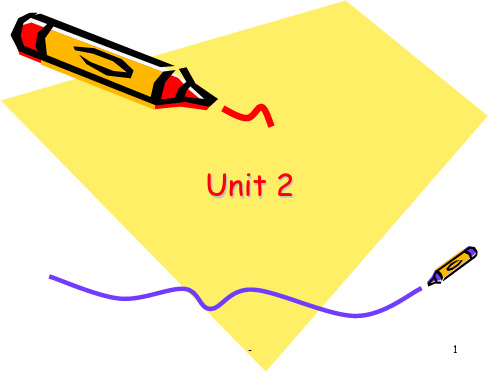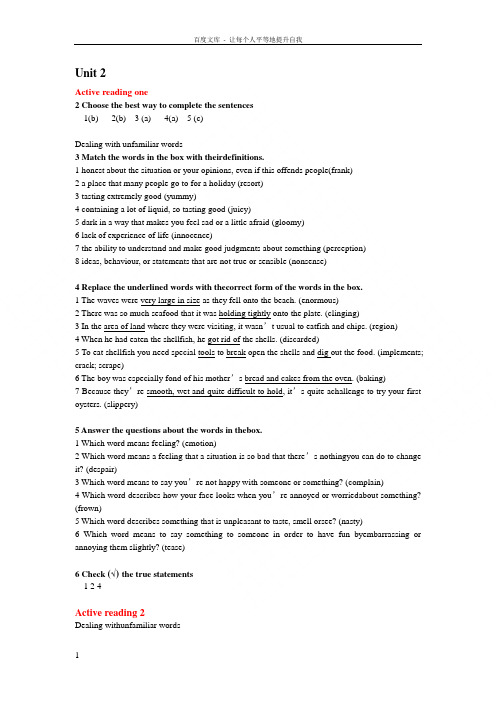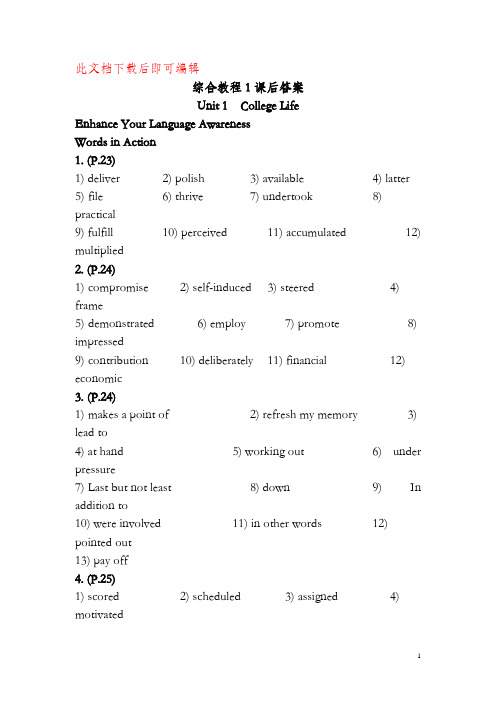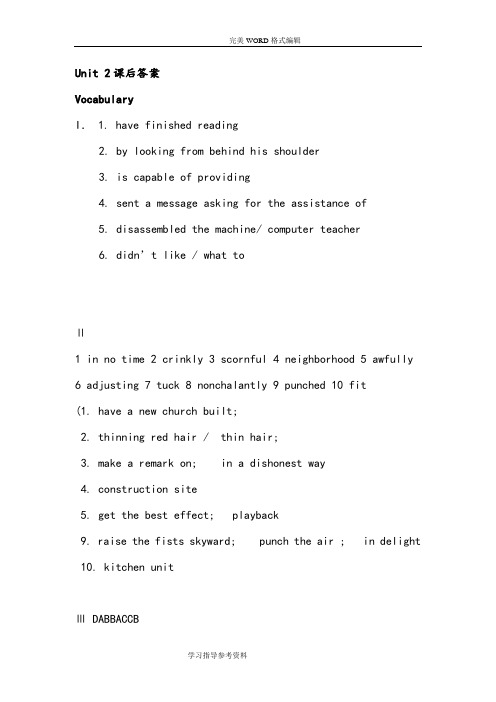综合教程1册2单元答案.ppt
应用型大学英语综合教程第一册2单元

上海交通大学出版社
Next
Text Lead-in
Text organization
Introduction
3
1 Para. _____
Body
The background of the story. The snobbishness of a landlord who mistook Jefferson for an old farmer.
2-4 Para. _____
Para.
2-3 _____
Para.
The contempt of the landlord and his town fellows for the farmer-like Jefferson.
The revelation of the identity of Jefferson and the landlord’s somersault in his attitude. Jefferson’s rejection of the landlord’s offer.
6
嗨,对他来说,到哪儿住 plainly: ad. 都一样。”旅馆老板答道, 1) 简朴地;朴素地 “这种人有堆干草可躺,和 reddish-brown: 棕红色的 e.g. He dreamed of living mud-bespattered: 溅上泥浆的 马一块吃住就不错了。”旅 Suffix “-ish”on a small+ p.p.)构 plainly means “lightly”. 名词+过去分词(n. island. 行者很快来到旅馆门前。他 e.g. 清 晰 地 ; 明 显 地 , 清 楚 2) yellowish 浅黄色的 成形容词短语。 衣着朴素,棕红头发,脸上 地 e.g. greenish 浅绿色的 heart-broken 伤心欲绝的 有污泥,就像一个从偏远地 grayish 浅灰色的 e.g.wood-made 木制的 plainly Her forced smiles 区刚进城的勤劳的乡下人。 indicated her reluctance to breast-fed 母乳喂养的 “这儿有客房吗?”他向旅 lend him her car. 馆老板问道。
综合教程第一册(上海外语教育出版社)unit-2PPT课件

3) have to admit the truth of something., esp. sth. Unpleasant.
fundamental to good social relations. Do you think it is always so? Please give some examples to support your viewpoints.
-
3
• Part One: (Paragraphs 1)
-
8
• get away:
1) succeed in leaving
E.g. When I asked him if he would like to see a film, he said he was so busy doing a project that he couldn’t get away.
• be aware of the different forms and values of
Manners in different cultures.
-
2
Text one
Whatever Happened to Manners?
• When do you think a “thank you” is necessary? • What do you think a good manner really is? • In many people’s opinions, good manners is
– I feel that many people in the contemporary world are, for some reason or other, not as nice, not as friendly, or not as polite as one another as people in the past.
大学英语综合教程第一册Unit 2课后练习答案

5) The cost of equipping the new hospital was estimated at $2 million.
4) The author got to learn more about their friendship by reading the letter himself.
2.
Parts Paragraphs Main Ideas Part One Paras 1-20 From a conversation with the cab driver the author learned how much he regretted failing to keep up correspondence with his old friend Ed. Part Two Paras 21-35 Reading the letter by himself, the author learned more about the lifelong friendship between the driver and Old Ed. Part Three Para 36 The driver's experience urged the author to reach for his pen.
3. 1) A couple of flights at Pudong Airport were postponed this morning because of the awful weather. It is estimated that over one thousand passengers were held up.
综合教程1Unit2课后习题答案

Unit 2Active reading one2 Choose the best way to complete the sentences1(b) 2(b) 3 (a) 4(a) 5 (c)Dealing with unfamiliar words3 Match the words in the box with theirdefinitions.1 honest about the situation or your opinions, even if this offends people(frank)2 a place that many people go to for a holiday (resort)3 tasting extremely good (yummy)4 containing a lot of liquid, so tasting good (juicy)5 dark in a way that makes you feel sad or a little afraid (gloomy)6 lack of experience of life (innocence)7 the ability to understand and make good judgments about something (perception)8 ideas, behaviour, or statements that are not true or sensible (nonsense)4 Replace the underlined words with thecorrect form of the words in the box.1 The waves were very large in size as they fell onto the beach. (enormous)2 There was so much seafood that it was holding tightly onto the plate. (clinging)3 In the area of land where they were visiting, it wasn’t usual to eatfish and chips. (region)4 When he had eaten the shellfish, he got rid of the shells. (discarded)5 To eat shellfish you need special tools to break open the shells and dig out the food. (implements; crack; scrape)6 The boy was especially fond of his mother’s bread and cakes from the oven. (baking)7 Because they’re smooth, wet and quite difficult to hold, it’s quite achallenge to try your first oysters. (slippery)5 Answer the questions about the words in thebox.1 Which word means feeling? (emotion)2 Which word means a feeling that a situation is so bad that there’s nothingyou can do to change it? (despair)3 Which word means to say you’re not happy with someone or something? (complain)4 Which word describes how your face looks when you’re annoyed or worriedabout something? (frown)5 Which word describes something that is unpleasant to taste, smell orsee? (nasty)6 Which word means to say something to someone in order to have fun byembarrassing or annoying them slightly? (tease)6 Check (√) the true statements1 2 4Active reading 2Dealing withunfamiliar words4 Answer the questions about the words andexpressions in the box.1 (a) moreactive2 (a) itsfeatures3 (b) the reason for it4 (b) made in afactory5 (a) help causehormones to leave the brain6 (a) press itstrongly7 (b) your parents8 (b) liquid9 (a) tellpeople5 Replace the underlined words with thecorrect form of the words in the box.Key: (1) luxury (2) nourishing (3) mould (4) manufacturer (5) snap(6) condensed (7) flavour (8) popularity (9) genetic (10) traitLanguage in usegiving extrainformation1 Rewrite the sentences.1 The restaurant was in a French seaside resort by the Atlantic Ocean, whereyou get excellent seafood.2 My father, who wanted me to try my first oyster, had decided to take mefor lunch to a restaurant.3 The oyster, which was slippery, was unlike anything I have ever tasted before or since.4 Chocolate is made from the beans of the cacao tree, Theobroma cacao, which means “food of the gods”.5 The world’s best-selling type of chocolate, milk chocolate, which is sweeter and smoother than dark chocolate, didn’t appear until the end of the 19th century.6 Daniel Peter, who was Swiss, perfected the process of making milk chocolate.leaving out words2 Rewrite the sentences.1 and the waiter had already brought an enormous portion of seafood, crabs,prawns, lobsters and all sorts of shellfish clinging onto each other ...2 On his plate was a pile of discarded lobster claws, and alongside was abattery of implements used to crack the shells ...3 The next development was learning how to get cocoa butter from the beans, a process first tried in 1825.4 Condensed milk is a thick, sweet milk sold in cans.5 Hormones are a chemical substance produced by your body. word formation4 Answer the questions with the words youformed in ActivityWhat’s the word for:1 how you feel if the sea makes you ill? (seasick)2 someone who likes shopping a lot? (shopaholic)3 what something is if it is useful and providing help? (helpful)4 what a flight is if it goes directly from one place to another? (non-stop)5 someone who doesn’t smoke? (non-smoker)6 writing which is about real people and events, not imaginary ones? (non-fiction)5 Translate the sentences into Chinese.1 外面,天空灰蒙蒙的,海面上刮来一阵强风。
综合教程1课后答案(完整资料).doc

此文档下载后即可编辑综合教程1课后答案Unit 1 College LifeEnhance Your Language AwarenessWords in Action1. (P.23)1) deliver 2) polish 3) available 4) latter 5)file 6) thrive 7) undertook 8) practical9) fulfill 10) perceived 11) accumulated 12) multiplied2. (P.24)1)compromise 2) self-induced 3) steered 4) frame5)demonstrated 6) employ 7) promote 8) impressed9)contribution 10) deliberately 11) financial 12) economic3.(P.24)1)makes a point of 2) refresh my memory 3) lead to4) at hand 5) working out 6) under pressure7) Last but not least 8) down 9) In addition to10) were involved 11) in other words 12) pointed out13) pay off4. (P.25)1) scored 2) scheduled 3) assigned 4) motivated5) crucial 6) promote 7) perform 8) debate9) scanned 10) devised 11) advocated 12) clarify13) priorities 14) compromised 15) context 16) undertookFinal sentence: academic excellenceIncreasing Your Word Power1.( P.26~27)1)principal/ major 2) top 3) major 4) top5)principal 6) major 7) schedule8)advocate/have advocated 9) top 10) approach11)blame 12) major/ principal 13) advocate 14) schedule15)blame 16) approaching 17) pressure 18) pace19)pressured 20) paceCloze (P.31)1)academic 2) priorities 3) conducted 4) principles5)begin 6) priority 7) compromised 8) addition9)filling 10) Speaking 11) formula12)Participation/ Participating 13) based 14) least15)way 16) pressureTranslation (P.31~P.32)1). The judge asked the reporter not to disclose the name of the victim.2). The teacher took pains to make sure that we all understood what he said.3). Recently the school conducted a survey among those students who have attained academic excellence.4). He said he would accept the job, so we have asked him to confirm his acceptance by writing us a letter.5). George studies very hard. He wanted to make the most of his chance to learn.6). We can’t go. To begin with, it’s too cold. Besides, we’re busy.7). It’s about time that someone spoke up for these basic truths/ facts.8). You should be working instead of lying there in bed at this time of the year.9). I’ll jot down some notes while he’s speaking.10). I can’t carry the suitcase on my own; it’s too heavy.Unit 2 Learning a LanguageEnhance Your Language AwarenessWords in Action (P.54)1. (P.54)1)assume 2) argued 3) claim4)equivalents 5) individual 6) personal 7) precise8)qualified 9) adventure s 10) furthermore 11) intelligent12) solemnly2.(P.54)1) obtain 2) confident 3) communicate4) advantage 5) relevant 6) helpful。
综合教程1第二单元课后练习答案解析

Unit 2课后答案VocabularyI. 1. have finished reading2. by looking from behind his shoulder3. is capable of providing4. sent a message asking for the assistance of5. disassembled the machine/ computer teacher6. didn’t like / what toⅡ1 in no time2 crinkly3 scornful4 neighborhood5 awfully6 adjusting7 tuck8 nonchalantly9 punched 10 fit(1. have a new church built;2. thinning red hair / thin hair;3. make a remark on; in a dishonest way4. construction site5. get the best effect; playback9. raise the fists skyward; punch the air ; in delight10. kitchen unitⅢ DABBACCB(4. code of conduct6. by a score of 1-28. a way out of this trouble)Ⅳ1 funny, interesting, interesting, funny(funny is a very formal word, focusing mainly on whatever results in laughter because of oddness, abnormality, or inappropriateness. Interesting refers to something that attracts people’s attention, usually and deserves their observation and study.)2 silent, silent, still, still(Still suggests a tranquil state, and often refers to a moment of calm between periods of noise and movement, and during this moment there is no sign of activity. Silent simply means “becoming speechless or being without noise”; it does not necessarily suggest serenity or motionlessness.)3 dispute, arguing, disputing, arguing(Dispute is often used as a transitive verb及物动词, meaning “say that something is incorrect or untrue; fight passionately for 激烈争夺control or ownership of something.”Argue usually refers to a reasoned presentation of views or to a heated exchange of opinion; very often, when usedintransitively不及物动词时, it is followed by prepositions 介词 like “with”, “for/ against”, “about” , etc.)4 usual, usual, Regular, regular(usual is applied to whatever recurs frequentlyⅤ1. Today Tommy found a real book.Synonyms: actual, genuine, true2. They turned the pages, which were yellow and crinkly, and it was awfully funny to read words that stood still instead of moving the way they were supposed to —on a screen, you know.Antonyms: moving, movable, mobile, restless,3. They turned the pages, which were yellow and crinkly, and it was awfully funny to read words that stood still instead of moving the way they were supposed to —on a screen, you know.Synonyms: rough, coarse, uneven4. Margie always hated school, but now she hated it more than ever.Antonyms: like, love, enjoy5. Margie was scornful.Synonyms: disdainful, contemptuous6. Tommy looked at her with very superior eyes.Antonyms: inferior, subordinate, secondary7. “Maybe,” he said nonchalantly.Synonyms: indifferently, coldly, coolly, casually, offhandedly8. Little girls learned better if they learned at regular hours.Antonyms: irregular, uncertain, randomⅥ1 pointless,2 reproductiom,3 unreliable,4 generosity,5 apologetic,6 disobedience,7 emplyer, emplyees,8 encouragementGrammar1 the, the2 a3 a, a , /4 a5 the6 /,the7 The, the , /8 the, the9 a, a , a10 a, a ,aⅡ1 ///2 /3 the, /4 the, /5 //6 The7 the8 the, the 9 the, / 10 /Ⅲ1 Light2 a noise3 very good weather4 bad luck5 president6 The vegetables7 war8 All the books9 coffee 10 poetryⅣ 1 / 2 the 3 / 4 the 5 the 6/ 7 / 8 theⅤ 1 A Briton falls to his death on the Matterhorn.2 An Olympic silver medalist dies in a crash.3 Callaghan recalls the British Ambassador from Chile.4 The army ends the chaos in the capital.5 A college student wins the first prize.Translation1..Yesterday a government delegation headed by the Minister of Foreign Affairs arrived in South Africa and began a three-day friendly visit to the country.2 It is awfully funny to look at these caricatures which satirize social ills.3 Computers are one of the most useful teaching aids, for all your lessons as well as all the questions asked and all the answers provided can be shown on a screen.4 Xiao Zhang’s mother fell ill the day before yesterday; he sent for a doctor immediately.5 He failed in the college entrance examination last year, but he did not feel disappointed. Instead, he continued to study hard, passed the examination successfully and became a student in a famous university this year.6 There are many English words that this middle school student cannot pronounce correctly.7 In this era of information explosion, we have to make constant efforts to renew our knowledge. Only thus can we become adjusted to the requirements of our work.8 With his shirt tucked into the top of his trousers and a leather bag tucked under his arm, the boy looked just like a boss.9 Although she is only eight years old, the little girl is already very good at calculating fractions. No wonder her parents feel proud of her.10 All the neighborhood have heard of the news, but you haven’t. Don’t you think it is strange?写作老师上课讲IV. Exercises for integrated skills1. DictationChildren learn almost nothing from television, / and the more they watch, / the less they remember. / They regard television purely as entertainment, / resent programs that make demands on them / and are surprised that anybody should take the medium seriously. / Far from being over-excited by programs, / they are mildly bored with the whole thing. / These are the main conclusions from a new study of children and television. / Its author confirms / that the modern child is a dedicated viewer. / The study suggests / that there is little point in the television company’s attempts / to isolate adult viewing in the later hours./ More than a third of the children regularly watched their programs after 9 p.m./ All 11-year-olds had watched programs after midnight.2. Fill in each blank in the passage below with ONE word you thinkappropriate.What (1) fun it is to jump into a pool or go swimming in a river in summer! Howjoyful and relaxing it is to have a (2) game of table tennis after a day of study at school! And how exciting it is to play or (3) watch a close game of basketball or volleyball! All over the world (4) millions of people take part in different kinds of sports. Sports are perhaps the most (5) popular form of relaxation that almost all can enjoy, no matter (6) who they are, boys or girls, men or women, young or old.Some people seem to think that sports and games are unimportant things that people do (7) at times when they are not working, instead of going to the cinema, listening to the (8) radio, or sleeping. But in fact sports and games can be of great (9) value, especially to people who work with their brains. They should not be treated only as (10) amusement.VII. Listening ExercisesFrom Television Back to GamesYou are going to hear a small talk in which the speaker compares television with board games.A.Listen carefully. Supply the missing words. For each blank you needof money onor spendingThey offer usInstead ofThey are, andmuch pretendpeople.B. Listen again and complete the following chart, which shows theTapescriptFrom Television Back to GamesIn a society where nobody is so fortunate as to be able to spend a lot of money on entertainment, most of us end up with either in front of a television or spending time with our family and friends playing a game of some kind. While television is probably the most popular form of home entertainment, there is a small group of us who still believe board games offer the most enjoyment. They offer us a variety of ways to learn new information, to test our skills, and most importantly, to bring us together.Television is one of our best sources of information, but a lot of times it is not the kind of information that you want or need. The commercials for instance always insult your intelligence. On the other hand, board games are set up to offer a variety of information, which can cover subjects such as geography, vocabulary, or financial investment. All of this information is offered in a way that makes you want to learn and lets you choose what you learn. I have acquired more information about history, geography, and science from “Trivial Pursuit” alone than I have ever been able to get from the boring way they are presented on television.Added to the benefits of learning new information, board games test your skills and knowledge with a particular outcome ahead. They let you use your ideas and strategies to win the game. Whether you are trying to get your opponent’s king inchess or trying to ma ke the most money in “Trump,” there is an outcome which you brought about with these ideas and strategies. However, you are forced to become a passive spectator when watching television. In some cases a program might be produced to stimulate your thought processes, but it doesn't offer you an outlet for following through with your ideas, such as the useless concept of the game show for entertainment.Still the most important difference between television and the board game is the interaction with others. Getting the family together to watch a show on television is nice; that is, if you can find a show on for the whole family. But playing a board game gives you the chance to learn, not only about the subject, but also about each other. Everyone is different, with their own views and unique ways of handling situations, giving each game a different outcome. One of the nicest parties I ever attended was one where we played a murder-mystery game called “How to Host a Murder.” We never knew what to expect next, and it was a wonderful way to get to know everyoneInstead of watching television all the time, people are finding that board games give us the outlet to test our skills and knowledge against each other. They are putting their remote controls away and giving up their “Executive Couch Potato” status, and gathering around the kitchen table for an exciting game. I would much rather pretend that I’m a millionaire, playing for the high stakes, rather than watch someone else on a glass tube pretending to be one. It’s more exciting, less expensive, and best of all, I spend the time with real and interesting people.。
(全新版)大学英语《综合教程》第一册Unit(2).ppt

• 6. encounter: (fml) meet, esp. unexpectedly • Example: She encountered an old friend on the street. • 7. ... the lack of it: Here it refers to animal intelligence. • 8. reveal: make (sth.) known • Example: A survey of the Chinese diet has revealed that a growing number of children in cities are overweight. • 9. convince: make (sb.) feel sure by the use of argument or evidence (used in the patterns: convince sb. of sth., convince sb. that) • Examples: 1) His parents managed to convince him that teaching was the most suitable profession for him. • 2) We finally convinced the police of our innocence. • (be convinced: feel certain that sth. is true • Example: I was convinced that we were doing the right thing.)
• 10. dominant: ruling; stronger, more powerful, or more noticeable than other people or things • Examples: 1) Charlie Chaplin was a dominant figure in the American film industry. 2) a dominant position 统治地位 • 11. make a deal: reach an agreement or arrangement, esp. in business or politics • Examples: 1) I'll make a deal with you — you wash the car and I'll let you use it tonight. • 2) The car company has made a deal with a Japanese firm, which will supply engines in exchange for brakes. • 12. ... only to be met with a blank stare: • Only to (do sth.) is often used to indicate that sb. did sth. with a disappointing or surprising result. Infinitive to functions as result adverbial. • Examples: 1) He hurried to the railway station, only to find that the train had left. 2) He had once tried inviting her out, only to meet with a rather cool response.
新标准大学英语(第二版)综合教程1答案截图及课文翻译U2

第一只牡蛎1 “来,尝尝这个,这个好吃,”我父亲一边说一边在我的鼻子前晃动着一只牡蛎。
2 我皱起眉头,说:“我不吃,我不喜欢吃这个。
”3 “胡说,你没尝过怎么知道不喜欢吃。
”他跟我论理,“把它放进嘴里,品尝一下大西洋的味道。
”4 我想他说得对,可是有时候有些东西你只要看一眼就知道喜不喜欢。
坦率地说,我觉得牡蛎看起来挺恶心的。
5 这座饭店坐落在法国一个海滨旅游胜地。
这时侍者不仅端上了一客分量极大的海鲜——螃蟹、对虾、大龙虾及各种贝类都堆在一起,还拿来了一瓶放在冰篮子里的白葡萄酒。
我母亲正忙着购物,于是我父亲就决定带我——他十岁的儿子——去吃午饭。
他要让我体验生命里一件重要的事情,一件对我父亲来说与成年一样重要的事:我的第一只牡蛎。
6 第一个吃牡蛎的男人到底是怎么想的呢?我说“男人”是因为女人肯定不会这么傻吧?“噢,我有点饿了,我们来瞧瞧这个石坑……嗯,我觉得它看起来挺好吃的!”好像不太可能。
父亲的话听起来更像是男生式的挑战。
“来,你尝尝这只牡蛎,我来尝尝这块油滋滋的咸肉三明治,让我们看看谁吃得更开心!”7 外面,天空灰蒙蒙的,海面上刮来一阵强风。
天气看起来和我的心情一样阴郁。
没有希望,只感觉饿,只担心失去纯真,因为我意识到这第一只牡蛎我今天非吃不可了。
8 “我能吃炸鱼和薯条吗?”我满怀希望地问。
我突然想吃我最爱吃的菜。
9 “当然不行!他们这儿没有炸鱼和薯条,只有这地方最上等的海鲜,在这方圆几英里之内你找不到更好的海鲜了。
”他边回答边给自己又倒了一杯酒。
“好啦,别抱怨了,就给我尝一只牡蛎,然后你就可以吃些好吃、顺口的东西,比如对虾加黄油面包。
”他提议说。
整顿饭中,他的话中第一次有了妥协的意思。
10 但是,尽管清晰地感觉到了他的妥协——只有一个十岁的男孩才有这样的感觉,我仍然明白这妥协包含着吃掉那只牡蛎,那只放在我父亲的盘子边上的牡蛎。
11 我父亲继续吃着那一堆海鲜。
他盘子里放着一大堆被丢弃的龙虾爪,盘子边上放着一套工具,用来敲开蟹壳,剔出哪怕一丁点儿的蟹肉。
- 1、下载文档前请自行甄别文档内容的完整性,平台不提供额外的编辑、内容补充、找答案等附加服务。
- 2、"仅部分预览"的文档,不可在线预览部分如存在完整性等问题,可反馈申请退款(可完整预览的文档不适用该条件!)。
- 3、如文档侵犯您的权益,请联系客服反馈,我们会尽快为您处理(人工客服工作时间:9:00-18:30)。
Unit 2 p. 43 Cloze: Text-related
(1) choked up
(2) awful
(3) practically
(4) neighborhood
(5) correspondence (6) available
(7) destination
(8) reunion
(9) Mostly
Unit 2 p. 44 Translation: Sentences
(4) He stayed in Australia with his parents all the way through World War II.
(5) Since I graduated from Nanjing University in 1985, I have kind of lost touch with my classmates.
Unit 2 p. 40 Vocabulary Ex. 1
1) absolutely
2) available
3) every now and then
4) are urging/urged
5) destination 6) mostly
7) hangs out
8) right away
9) reunion
(2) Mary looks as if she's very worried about the Chinese exam because she hasn't learned the texts by heart.
(3) Since the basketball match has been postponed, we might as well visit the museum.
10) or something
11) estimate
12) going ahead
Unit 2
p. 40-41 Vocabulary Ex. 2
1) in the exmination was still on his mind.
2) was completely choked up by the sight of his team losing in the final minutes of the game.
Unit 2
p. 45 Translation: Passage
It is not easy to keep in touch with friends when they are far away. This is certainly true in my case.
It has been a couple of years since I left my old neighborhood and all the friends I had there. I've been meaning to write to them but something or other comes up and I just don't seem to find the time. They are always on my mind, however, and I think I will certainly make an effort to keep up correspondence with them in future.
(10) postponing
(11) absolutely
Unit 2 p. 43-44 Cloze: Theme-related
(1) how
(2) savings
(3) embarrassment (4) phone
(5) interrupted
(6) touch
(7) envelope
Unit 2 p. 41 Vocabulary Ex. 3
1) were postponed, the awful, is estimated
2) reference, not availabe, am kind of 3) not much of a teacher, skips, go
ahead
Unit 2 p. 42 Vocabulary: Collocation
1. to
2. for
3. at
4. from
5. in
6. to
7. on
8. with
Unit 2 p. 42 Vocabulary: Usage
1. more or less 2. kind of/sort of 3. Something 4. kind of/sort of 5. more of less 6. or something
3) was so lost in study that she forgot to have dinner.
4) has come up and I'm afraid I won't be able to accomplish the project on time.
5) of equipping the new hospital was estimated at $2 million.
(8) signed
(9) message
(10) needed
Unit 2 p. 44 Translation: Sentences
(1) Half an hour had gone by, but the last bus hadn't come yet. We had to walk home.
